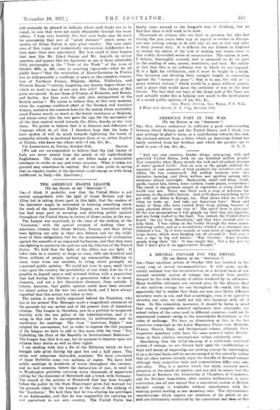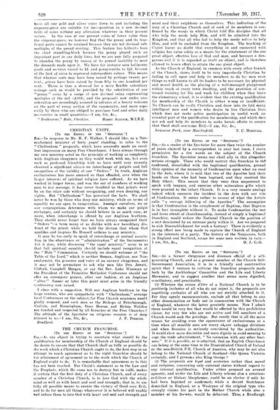A DECIMAL COINAGE FOR THE UMPIRE. (TO TR. EDITOR or
yes " SPECTSTOR."1 SIR,—Your excellent artiole of October 13th has resulted in the usual crop of varied recommendation«. It still seems insuffi- ciently realised that the reconstruction on a decimal basis of our present unwieldy system of coinage has already been greatly delayed by the wide diversity of advice tendered by its advocates. Many would-be reformers are carried away by the illusive idol of one uniform coinage for use throughout the world, but they apparently fail to realize that there are now over thirty different monetary units in use, and that accordingly, even if we agreed to abandon our own, we could not fall into harmony with oil of them. In this connexion, moreover, it should be borne in mind that even if complete nominal uniformity were attainable, the actual values of the coins used in different countries could not he maintained constant owing to the unavoidable fluctuation% in the rates of exchange. We have an illustration of this in the five countries comprised is the Latin Monetary Union—via., Belgium, France, Greece, Italy, and Switzerland—where, although their respective monetary units have the Name stamina/ value, fluctua- tions in their relative international value. constantly arise.
Abandoning then the will-o'-the-wisp of a world-wide universal system of coinage, we are thrown back upon the consideration of ways and means of improving our existing coinage by rearranging it on a decimal basis, and we are encouraged at the outset by noting that all other nations already enjoy the benefits of decimal coinage although their respective units and nomenclature differ very cost.
siderably. This is a matter which has lately received much attention at the hands of experts, and you will be swan, that the Institute of Banker., the Association of Chambers of Commerce, and the Decimal Association, after mature deliberation in joint conference, are all now agreed that a convenient system of British decimal coinage is available without interference with the existing pound sterling as our monetary unit. The international considerations which require our retention of the pound as our unit are fortunately reinforced by the convenient fact that on this basis all our gold and silver coins down to and including the sixpenny-piece are suitable for inco-poration in a new decimal table of coins without any alteration whatever in their prekent cranes. In the ease of our present coins of lower value than the sixpenny-piece, we however find that the penny and its frac- tional parts cannot be retained because they are not decimal sub- multiples of the pound sterling. This feature hos hitherto been the chief stumbling-block because the penny played such an important part in our daily tires, but we are now fully prepared to abandon the penny by reason of its proved inability to meet the demands made upon it. We have for instance seen halfpenny goods and services raised to ld. and pennyworths to lid. because of the lack of coins to represent intermediate value's. Thismeaes that whereas costs may have been raised by perhaps twenty per cent., prices have been raised by from fifty to one hundred per tent. There is thus a demand for a more flexible subsidiary coinage such as would be provided by the substitution of our "penny " coins by a range of new decimal coins representing multiples of the mil (A.001), and the proposals now under con- sideration are accordingly assured in advance of a hearty welcome en the part of every section of the community, and more espe- cially by those who are obliged to purchase food and other doily necessaries in small quantities.—I am, Sir, Ste.,



































 Previous page
Previous page